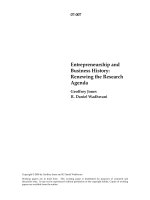ENTREPRENEURSHIP Social Entrepreneurship
Bạn đang xem bản rút gọn của tài liệu. Xem và tải ngay bản đầy đủ của tài liệu tại đây (875.16 KB, 297 trang )
Social Entrepreneurship
Edited by
Johanna Mair, Jeffrey Robinson
and Kai Hockerts
Social Entrepreneurship
This page intentionally left blank
Social Entrepreneurship
Edited by Johanna Mair, Jeffrey Robinson and Kai Hockerts
Selection and editorial matter © Johanna Mair, Jeffrey Robinson, Kai
Hockerts 2006 Individual chapters © contributors 2006
All rights reserved. No reproduction, copy or transmission of this
publication may be made without written permission.
No paragraph of this publication may be reproduced, copied or transmitted
save with written permission or in accordance with the provisions of the
Copyright, Designs and Patents Act 1988, or under the terms of any licence
permitting limited copying issued by the Copyright Licensing Agency, 90
Tottenham Court Road, London W1T 4LP.
Any person who does any unauthorized act in relation to this publication
may be liable to criminal prosecution and civil claims for damages.
The authors have asserted their rights to be identified as the authors of this
work in accordance with the Copyright, Designs and Patents Act 1988.
First published 2006 by
PALGRAVE MACMILLAN
Houndmills, Basingstoke, Hampshire RG21 6XS and
175 Fifth Avenue, New York, N. Y. 10010
Companies and representatives throughout the world
PALGRAVE MACMILLAN is the global academic imprint of the Palgrave
Macmillan division of St. Martin’s Press, LLC and of Palgrave Macmillan Ltd.
Macmillan® is a registered trademark in the United States, United Kingdom
and other countries. Palgrave is a registered trademark in the European Union
and other countries.
ISBN-13: 978–1–4039–9664–0 hardback
ISBN-10: 1–4039–9664–4
hardback
This book is printed on paper suitable for recycling and made from fully
managed and sustained forest sources.
A catalogue record for this book is available from the British Library.
Library of Congress Cataloging-in-Publication Data
Social entrepreneurship / edited by Johanna Mair, Jeffrey Robinson &
Kai Hockerts.
p. cm.
“This book results from an international conference held at IESE
Business School, Barcelona, in March 2005”–Introd.
Includes bibliographical references and index.
ISBN 1–4039–9664–4 (cloth)
1. Social entrepreneurship–Congresses. I. Mair, Johanna, 1967–
II. Robinson, Jeffrey, 1971– III. Hockerts, Kai, 1970– IV. Universidad de
Navarra. Instituto de Estudios Superiores de la Empresa.
HD60.S59 2006
306.3’42–dc22
2005056487
10
15
9
14
8
13
7
12
6
11
5
10
4
09
3
08
2
07
1
06
Printed and bound in Great Britain by
Antony Rowe Ltd, Chippenham and Eastbourne
Contents
List of Tables
vii
List of Figures
viii
List of Appendices
ix
Notes on Contributors
x
Acknowledgments
Chapter 1
Part I
xvi
Introduction
Johanna Mair, Jeffrey Robinson and Kai Hockerts
Perspectives and Agenda for Research
Chapter 2
1
15
Introduction to Part I – Setting a Research
Agenda for an Emerging Field
Ignasí Martí
17
Three Avenues for Social Entrepreneurship
Research
James E. Austin
22
Politics, Values and Social Entrepreneurship:
A Critical Appraisal
Albert Hyunbae Cho
34
Social Entrepreneurship: Innovation and Social
Change Across Theory and Practice
Francesco Perrini and Clodia Vurro
57
Part II
Opportunities and Intentions
87
Chapter 6
Introduction to Part II – Exploring the Intentions
and Opportunities Behind Social Entrepreneurship
Johanna Mair
89
Chapter 3
Chapter 4
Chapter 5
Chapter 7
Navigating Social and Institutional Barriers to
Markets: How Social Entrepreneurs Identify and
Evaluate Opportunities
Jeffrey Robinson
v
95
vi Contents
Chapter 8
Part III
Chapter 9
Social Entrepreneurship: How Intentions to
Create a Social Venture are Formed
Johanna Mair and Ernesto Noboa
Strategy, Structure and Outcome
Introduction to Part III – Understanding the
Strategy, Structure and Outcomes in Social
Ventures
Jeffrey Robinson
Chapter 10 Entrepreneurial Opportunity in Social Purpose
Business Ventures
Kai Hockerts
Chapter 11 Ownership, Mission and Environment: An
Exploratory Analysis into the Evolution of a
Technology Social Venture
Geoffrey Desa and Suresh Kotha
Chapter 12 Social Enterprise: Beyond Economic Outcomes
and Individual Returns
Helen Haugh
Part IV Integrating Sustainability and the
Environment
121
137
139
142
155
180
207
Chapter 13 Introduction to Part IV – Ecopreneurship: Unique
Research Field or Just ‘More of the Same’?
Kai Hockerts
209
Chapter 14 Green-Works: A Model for Combining Social and
Ecological Entrepreneurship
Anne Clifford and Sarah E. A. Dixon
214
Chapter 15 Social Entrepreneurs Directly Contribute to
Global Development Goals
Christian Seelos, Kate Ganly and Johanna Mair
235
Index
276
List of Tables
Table 1.1
Table 7.1
Table 7.2
Table 7.3
Table 7.4
Table 10.1
Table 11.1
Table 12.1
Table 12.2
Table 12.3
Table 14.1
Table 14.2
Table 14.3
Table 14.4
Table 14.5
Table 14.6
Table 15.1
Table 15.2
Table 15.3
Definitions of social entrepreneurship concepts
within this volume
Examples of social entry barriers in social sector
markets
Examples of institutional entry barriers in social
sector markets
Case details of social entrepreneurs in an inner
city context
Case details of social entrepreneurs not in an
inner city context
A conceptual framework for social entrepreneurial
opportunities
Technology social venture projects within Benetech
(circa. mid-2004)
Beyond direct economic outcomes
Summary of case study organizations
Outcomes indicator
Typical entries in data display
An entrepreneurial organization
Balancing the triple bottom line
Economic viability: Green-Works’ Financial
Report 03/04
Green-Works’ pricing scheme
Creating networks
The Millenium Development Goals and targets
Least Developed Countries
Mapping of Schwab Foundation Social
Entrepreneurs to MDGs
vii
4
102
103
108
108
146
159
186
191
196
217
219
221
224
225
227
239
247
251
List of Figures
Figure 5.1
Figure 7.1
Figure 7.2
Figure 8.1
Figure 11.1
Figure 11.2
Figure 11.3
Figure 14.1
Figure 15.1
Figure 15.2
Figure 15.3
The point of view of the practitioner: a descriptive
framework of the social entrepreneurial process
Opportunities orientation in entrepreneurship
Navigating social and institutional entry barriers
A model of social entrepreneurial intention
formation
Project development process at Benetech
(based on the venture capital model)
Emerging propositions from Benetech case:
factors affecting TSV origin and evolution
Emerging propositions: effects of TSV evolution
and ownership on project mission and scope
A model for combining social and ecological
entrepreneurship
Distribution of Schwab Foundation social
entrepreneurs
Social enterprises impacting MDGs in the
bottom 30 per cent of the HDI
Number of social enterprises impacting
Millennium Development Goals
viii
78
105
106
126
163
172
175
229
245
249
250
List of Appendices
Appendix 5A
List of analyzed SEVs
Appendix 14A Interview guide and links to original research
questions
Appendix 15A List of Schwab Foundation social
entrepreneurs
ix
80
232
256
Notes on Contributors
James Austin
Dr Austin holds the Snider Professorship of Business Administration
at the Harvard Business School. He has been a member of the
Harvard University faculty since 1972. His Doctor of Business
Administration and MBA degrees are from Harvard University.
Professor Austin was the cofounder of the School’s Social Enterprise
Initiative. He has authored 16 books, dozens of articles, and over a
hundred case studies on business organizations. His most recent
award-winning book is The Collaboration Challenge: How Nonprofits
and Business Succeed through Strategic Alliances. Dr Austin has given
seminars and served as an advisor to managers and government
officials around the world, including being a special advisor to the
White House. He has served on many nonprofit and corporate
boards.
Albert Cho
Albert Cho is an independent researcher. He received an A.B. in
Social Studies, summa cum laude and Phi Beta Kappa, from Harvard
College, and received an MS in development economics and an MBA
with distinction from the University of Oxford, where he was a
Rhodes Scholar. He has worked at the World Resources Institute and
the United Nations Millennium Project, where he conducted
research on education, health and the environment Millennium
Development Goals. He has published research on international
trade and environmental policy, social entrepreneurship, and identity politics. Albert is now an Associate in the Washington, DC office
of McKinsey & Co. and splits his time between DC and Brooklyn,
NY.
Anne Clifford
Anne Clifford runs a marketing and development department for a
UK-based charity. After a career in the entertainment industry,
she recently completed an MBA at Kingston Business School. She
also spent several very enjoyable months volunteering for GreenWorks, the organization on which the research in this book was
based.
x
Notes on Contributors xi
Geoffrey Desa
Geoffrey Desa is a doctoral student of technology entrepreneurship
and strategic management at the University of Washington Business
School in Seattle. He holds a BS in Electrical Engineering from Georgia
Institute of Technology and a MS in Electrical Engineering from
Stanford University. His research interests lie at the intersection of
technology and social entrepreneurship, to understand how social
entrepreneurs use new technologies in resource limited environments.
He teaches strategic management and entrepreneurship in the undergraduate business program. Geoffrey has worked in R&D at HewlettPackard, Agilent Research Laboratories and Novera Optics, in Silicon
Valley, California.
Sarah E. A. Dixon
Sarah E. A. Dixon is a principal lecturer in strategic management at
Kingston Business School, London, UK. She is subject leader for strategy
and organizes the Strategy into Practice guest lecture series. She holds an
MBA from Kingston Business School and is studying for her DBA at
Henley Management College. She is a Fellow of the Chartered Management Institute. She worked for 23 years for Shell in various management
positions including expatriate postings as business manager in Austria
and Russia and roles in strategic planning and mergers and acquisitions
in London. Her research interests are focused on two main areas – organizational transformation in transition economies, in particular the
Russian oil industry, and social and ecological entrepreneurship.
Kate Ganly
Kate Ganly is a research assistant at IESE Business School, Barcelona.
She holds a BA in English and Anthropology from the University of
Sydney, Australia. Kate has worked as a marketing manager in book
retailing and is currently pursuing a career in the publishing industry
in London.
Helen Haugh
Helen Haugh is a lecturer at the Judge Business School, University
of Cambridge. She holds a BS Management Sciences (UMIST), MA
European Marketing Management (Brunel) and PhD in Management
(Aberdeen). Dr Haugh is Course Director for the Masters in Community
Enterprise at the Judge Business School – the first postgraduate management qualification for community enterprise practitioners to be delivered in the UK. Her research interests and teaching responsibilities
xii Notes on Contributors
embrace entrepreneurship, management and strategy and she has a
specific interest in the potential of organizations (private, public and
nonprofit) to contribute to economic, social and environmental regeneration. During her academic career, Dr Haugh has also worked as a
management consultant and executive educator.
Kai Hockerts
Kai Hockerts is Adjunct Professor and Senior Research Program Manager
at INSEAD’s Center for the Management of Environmental and Social
Responsibility (CMER) in Fontainebleau, France, where he is heading a
team of six research associates. His primary research focus is on corporate
sustainability strategy and environmental entrepreneurship research. He
teaches a course on ‘Blended Value Strategies – Transforming the NonProfit Sector’ as well as on ‘Environmental Sustainability and Competitive
Advantage’. He has given numerous talks to academic audiences and
practitioners on a broad variety of topics linked to corporate sustainability, environmental management, and social responsibility. Dr Hockerts
holds a PhD in Management from the University St Gallen, Switzerland
and a Diploma in Business Administration from the University of
Bayreuth, Germany. Kai’s business experience includes work as a management consultant for Life Cycle Assessments and Eco-Design at Ecobilan
S.A., Paris.
Suresh Kotha
Suresh Kotha is Professor of Management and Organization, and
Faculty Director of the Center for Technology Entrepreneurship, at the
University of Washington Business School. Dr Kotha holds the
Battelle/Oleson Excellence Endowed Chair in Entrepreneurship and
specializes in technology, strategic management and corporate entrepreneurship. He has published over 40 articles, many in peer-reviewed
journals. Suresh has been quoted in the Wall Street Journal, National
Public Radio, the Stanford Business school magazine, The Seattle Times
and The Post Intelligencer. Suresh has taught at the Stern School of
Business at New York University, the International University of Japan,
the University of Pretoria, and the Indian School of Business, India.
Johanna Mair
Johanna Mair is Assistant Professor of General Management at IESE, the
Business School of the University of Navarra in Barcelona, Spain. She
earned her PhD in Management with a specialization in Strategy from
INSEAD (Fontainebleau, France) and publishes in strategy and entrepre-
Notes on Contributors xiii
neurship journals. Professor Mair teaches strategy and social entrepreneurship in the MBA program, executive programs and the PhD program
at IESE. Her current research focuses on the intersection of traditional
strategy and social entrepreneurship. As such she is interested in entrepreneurial activity that aims at economic and social value creation, both
in the context of established and newly created organizations. Professor
Mair collaborates closely with the Schwab Foundation and Ashoka on
research and teaching and is involved in a global Teaching Innovation
Program by the Aspen Institute. She is also the coordinator of an EUsponsored program that fosters exchange and mobility between Asia and
Europe in the area of social entrepreneurship.
Ignasí Martí
Ignasí Martí is a doctoral candidate of management with a specialization in organization theory at the IESE Business School in Barcelona,
Spain. He holds a BS both in Economics and in Philosophy from the
University of Barcelona, an MS in Management from the IESE Business
School and an MS in Philosophy from the University of Barcelona. His
research lies at the intersection of organization theory, sociology and
entrepreneurship research: how by creating new institutions and by
transforming, deinstitutionalizing and replicating existing ones, social
entrepreneurs can enable the poor and the excluded to participate
more actively in society.
Ernesto Noboa
Ernesto Noboa recently joined IDE Business School in Ecuador as
Professor in the Business Policy Department. He teaches several courses
in the Executive MBA and other management programs including corporate strategy, strategy implementation and social entrepreneurship.
Professor Noboa’s research and teaching interests include corporate
strategy and social entrepreneurship. He is a PhD candidate in General
Management at IESE Business School (Barcelona, Spain) and has an
MBA from MIT Sloan School of Management (Massachusetts, USA) and
a Mechanical Engineering degree from the University of Dayton (Ohio,
USA). Before becoming a professor, Noboa worked for several years as
an executive in a consumer goods company in Ecuador.
Francesco Perrini
Francesco Perrini is Associate Professor of Management, CSR and Sustainability Innovation at the ‘Giorgio Pivato’ Management Department of
Bocconi University. He is also Senior Professor of Corporate Finance at
xiv Notes on Contributors
the SDA Bocconi School of Management. Since 1990 his research has
focused on strategic and innovation management and social issues in
management such as corporate governance, sustainability, social responsibility and social entrepreneurship. Prof. Perrini is director of CSR group
at SDA Bocconi; and a member of several boards including the Advisory
Board of SPACES, Bocconi’s, research center for ‘Security, Protection And
Corporate Social Responsibility and Entrepreneurial Sustainability’ and
the Board of the Italian Centre for Social Responsibility (I-CSR), Milan. In
2004–2005 Prof. Perinni spent the academic year at the Business Ethics
Department, Wharton School, University of Pennsylvania, as Visiting
Associate Professor and has collaborated on several international research
initiatives including the CSR Initiative, KSG at Harvard University and
the Multinational Enterprises Program at the International Labour
Organization in Geneva. He holds postgraduate degrees in Protection
Management and Financial Management, and a laurea degree in Business
Administration from Bocconi University.
Jeffrey Robinson
Jeffrey A. Robinson is Assistant Professor of Management at the Stern
School of Business, New York University. He holds a BS in Civil Engineering and a BA in Urban Studies from Rutgers, The State University
of New Jersey; a MS in Civil Engineering Management from Georgia
Institute of Technology and a PhD from Columbia University’s Graduate
School of Business. Professor Robinson spends much of his time writing
and researching about the role of entrepreneurs and entrepreneurship in
society and in developing the competitive advantage of regions and
nations. He is committed to research and informed policy making in the
areas of community economic development, social ventures, and social
and institutional barriers to markets. In 2001 he cofounded BCT Partners,
a firm that provides management, technology and policy consulting to
nonprofits, foundations, corporations and various government entities as
they plan and implement change strategies and improve organizational
effectiveness.
Christian Seelos
Christian Seelos recently joined the Malik Management Center,
St Gallen and is a Senior Researcher and Lecturer at IESE Business
School and other European schools in Business Strategy and Social
Entrepreneurship. He received his PhD from the University of Vienna
and his MBA from the University of Chicago, GSB. He previously held
positions as Head of Corporate Social Responsibility at BT Global
Notes on Contributors xv
Services and as Senior Consultant at Siemens Business Services. He led
the Biological Weapons disarmament work in Iraq for the United
Nations Special Commission for several years and helped in the buildup of an IT company as Vice President of Business Development.
Beginning his research career as Assistant Professor at the Medical
Faculty in Vienna, Christian has published a number of original papers
in leading science journals.
Clodia Vurro
Clodia Vurro is a PhD student of Business Administration and
Management at Bocconi University, Milan, Italy. She also works as
Research Assistant at Findustria – Center for Finance and Industry
Study and SPACES Bocconi, Research Center on ‘Security, Protection
And Corporate Social Responsibility & Entrepreneurial Sustainability’.
She is Teaching Assistant of Business Management and CSR &
Sustainability Innovation. Her primary research interests are socially
responsible corporate behavior and social entrepreneurship. She is
committed to research in the areas of tools and methods for the evaluation and measurement of social and environmental performance
and on the analysis of organizations dealing with complex social
problems through an innovation mindset and an entrepreneurial
lens. She holds a laurea degree in Economics and Management for
Arts, Culture and Communication from Bocconi University.
Acknowledgments
This book would not have been possible without the help of many
contributors. We are indebted to the authors for their work and their
willingness to contribute to this project; their hard work has made
this book possible. Special thanks to all of the participants at the first
International Social Entrepreneurship Research Conference (ISERC),
held at IESE Business School, University of Navarra in Barcelona,
Spain, 22–24 April 2005, who supported this work and made a vital
contribution to this book.
This conference provided the opportunity for the exchange of views
on social entrepreneurship among the more than sixty participants gathered there. It was supported by the Anselmo Rubiralta Center of Globalization and Strategy at IESE, and we would like to thank the many
people at IESE who actively supported the conference: Guillermo Nesi,
Claudia Thurner, and Gemma Golobardes. Additional support for the
conference was received from the Berkley Center for Entrepreneurial
Studies of NYU Stern School of Business and the CSR Platform, a collaborative effort of the European Academy of Business in Society and 12 academic partner institutions, funded by the European Commission Sixth
Framework Research Program.
Finally, we are especially grateful to Kate Ganly. Her support in organizing the conference and most of all her assistance in writing the
book made this project possible.
xvi
1
Introduction
Johanna Mair, Jeffrey Robinson and Kai Hockerts
What is social entrepreneurship?
The concept of social entrepreneurship (SE) is, in practice, recognized
as encompassing a wide range of activities: enterprising individuals
devoted to making a difference; social purpose business ventures
dedicated to adding for-profit motivations to the nonprofit sector; new
types of philanthropists supporting venture capital-like ‘investment’
portfolios; and nonprofit organizations that are reinventing themselves
by drawing on lessons learned from the business world. In the past
decade ‘social entrepreneurship’ has made a popular name for itself on
the global scene as a ‘new phenomenon’ that is reshaping the way we
think about social value creation. Some of these practices are uniquely
new however many have been around for a long time having finally
reached critical mass under a widely endorsed label.
SE as a field of research on the other hand is a relatively recent
phenomenon. Although the development of this field from a research
perspective will be discussed later in this introduction; we simply wish
to highlight here that although a large number of events have been
organized bringing together disparate audiences interested in the topic,
to date there have been few opportunities for scholars to gather and
discuss papers, themes and concepts relating specifically to the study of
SE.
Why produce this book?
This book results from an international conference held at IESE
Business School, Barcelona in March 2005, the first in a series devoted
specifically to SE research.
1
2 Social Entrepreneurship
The number of books, newsletters, and magazine articles written on
SE could easily fill several bookcases: why another handbook and yet
another event series? Given all that has been said and written about SE
it is surprising that very little rigorous research has been conducted on
the issue. Most of the work published so far has been based on anecdotal evidence or was targeted to promote specific initiatives. The conference series that has led to this volume’s publication was initiated by us
to help create space for academic researchers and thus to jumpstart
serious debate about this important field. By bringing established academic theories and research methods to the domain of SE, scholars can
provide much needed framing and scrutiny of an area of research that
is still in its infancy. At the same time we are convinced that the academic study of SE will have profound impact on many of the established
management theories.
The idea for this conference series first emerged at the June 2004
Babson Kauffman Entrepreneurship Research Conference in Glasgow.
The first planning meeting followed just weeks later at the Academy of
Management’s annual conference in New Orleans in August. Being
able to produce this volume just a little more than a year after this
initial meeting of the minds fills us with a sense of achievement. Such
an endeavor would have been impossible without the excellent work
done by the Barcelona team that organized and hosted our first International Social Entrepreneurship Research Conference (ISERC), as well
as the generous sponsorship of the Anselmo Rubiralta Center for
Globalization and Strategy at the IESE Business School.
Obviously a handbook such as this would have come to nothing
without the contribution of the many scholars who participated in the
meeting and subsequently contributed to this handbook. They are
testimony to the fact that there is already a growing body of academic
scholars conducting academically rigorous research work.
Antecedents and development of the field
In many ways, SE as a field of study is in startup mode. The creation of
a new field of study is exciting work and to that end, there have been
prelaunch activities. For example, some of the elements of what we
call the field of SE research were acquired from studies of nonprofit
leadership and management and the research being conducted at the
intersection of social issues (including environmental issues) and
management. Some of the studies on the nonprofit sector examined
how business-like practices were being used to achieve their notewor-
Johanna Mair, Jeffrey Robinson and Kai Hockerts 3
thy objectives. Other studies focused on the revenue generating strategies of nonprofit organizations. Studies categorized as social issues
management focused on the efforts of large multinational corporations and their corporate social responsibility programs and performance. None of these antecedents however discussed the creation of
new organizations.
The extensive literature on entrepreneurship has only recently
embraced the idea that entrepreneurial actors may be driven by more
than a profit motive. Some scholars have discussed the role of entrepreneurship in economic development. In our mind, all of these
efforts are the primordial soup out of which scholarship about SE has
risen.
Throughout this primordial stage, there were several papers written
that declared the arrival of a new set of ideas. Our scan of the previous
work in this area uncovered a handful of academic articles that used
the term ‘social entrepreneurship’ and were published in peer-reviewed
journals between 1990 and 2004. During this period, several interesting books on the subject also appeared. Many reports have appeared
on-line that describe small scale surveys of social ventures in various
regions. These reports and the books have provided important and
influential contributions to the discussion but might not meet the rigorous standards necessary to push forward knowledge in an academic
context.
The contents of this volume
The objective of the conference and this book is to stimulate scholarly
discourse. In 1999 Paul Hirsch and Daniel Levin wrote a wonderful
paper on the life cycle of scholarly constructs in which they describe
the tension between researchers who advocate broad ‘umbrella constructs’ and researchers who prefer narrowly defined issues and assume
the role of ‘validity police’ (Hirsch and Levin, 1999). They further describe how academic constructs undergo different phases from an initial
phase of excitement, through a phase of validity checks and then one
where typologies are dominant, before they either collapse or become
permanent. Applying their insights to the evolution of SE as an academic field we are clearly now in the ‘emerging excitement’ phase. Over
the last five years SE has received increasing attention from many
different sources – elites and politicians such as Tony Blair, businesspeople such as e-Bay founder Jeff Skoll, and institutions such as the
World Economic Forum.
Definitions of social entrepreneurship concepts within this volume
Author/s
Ch. Title
Definition
Austin
3
Three avenues for social entrepreneurship
research
‘Social entrepreneurship is innovative, social value creating
activity that can occur within or across the nonprofit,
business, and public sectors.’
Cho
4
Politics, values and social entrepreneurship:
a critical appraisal
‘…a quite general working definition of social
entrepreneurship: a set of institutional practices combining
the pursuit of financial objectives with the pursuit and
promotion of substantive and terminal values.’
Perrini/ Vurro 5
Social entrepreneurship: Innovation and
social change across theory and practice
‘…social entrepreneurs are change promoters in society; they
pioneer innovation within the social sector through the
entrepreneurial quality of a breaking idea, their capacity
building aptitude, and their ability to concretely demonstrate
the quality of the idea and to measure social impacts.’
‘We define SE as a dynamic process created and managed by
an individual or team (the innovative social entrepreneur),
which strives to exploit social innovation with an
entrepreneurial mindset and a strong need for achievement,
in order to create new social value in the market and
community at large.’
Robinson
Navigating social and institutional barriers
to markets: How social entrepreneurs
identify and evaluate opportunities
‘…I define social entrepreneurship as a process that includes:
the identification of a specific social problem and a specific
solution… to address it; the evaluation of the social impact,
the business model and the sustainability of the venture; and
the creation of a social mission-oriented for-profit or a
business-oriented nonprofit entity that pursues the double
(or triple) bottom line.’
7
4
Table 1.1
Table 1.1
Definitions of social entrepreneurship concepts within this volume – continued
Ch. Title
Definition
Mair/ Noboa
8
Social entrepreneurship: How intentions
to create a social venture are formed
‘…we define social entrepreneurship as the innovative use of
resource combinations to pursue opportunities aiming at the
creation of organizations and/or practices that yield and
sustain social benefits.’
Hockerts
10
Entrepreneurial opportunity in social
purpose business ventures
‘Social purpose business ventures are hybrid enterprises
straddling the boundary between the for-profit business world
and social mission-driven public and nonprofit organizations.
Thus they do not fit completely in either sphere.’
Desa/ Kotha
11
Ownership, mission and environment:
An exploratory analysis into the evolution
of a technology social venture
‘TSVs [technology social ventures]… develop and deploy
technology-driven solutions to address social needs in a
financially sustainable manner… TSVs address the twin
cornerstones of social entrepreneurship – ownership
(financial return) and mission (social impact) using advanced
technology.’
Haugh
12
Social enterprise: beyond economic
outcomes and individual returns
‘Social enterprise is a collective term for a range of organizations that trade for a social purpose. They adopt one of a
variety of different legal formats but have in common the
principles of pursuing business-led solutions to achieve social
aims, and the reinvestment of surplus for community benefit.
Their objectives focus on socially desired, nonfinancial goals
and their outcomes are the nonfinancial measures of the
implied demand for and supply of services.’
Clifford/
Dixon
14
Green-Works: A model for combining
social and ecological entrepreneurship
‘… the term “ecopreneur”…[defines] an ecopreneurial
organization as one that is a “system-transforming, socially
5
Author/s
6
Table 1.1
Definitions of social entrepreneurship concepts within this volume – continued
Author/s
Ch. Title
Definition
committed…break-through venture”, a definition that seems to
encompass both ecological and social enterprise. However
[this term] draws the focus too narrowly upon the
environmental aspects, and we therefore apply the term
“social ecopreneur”… to encompass the triple drivers of
these organizations: environmental, social and economic,
the latter being inherent in the concept of entrepreneurship.’
Seelos/Ganly/
Mair
15
Social entrepreneurs directly contribute to
global development goals.
The Schwab Foundation [source of the study population]
defines a social entrepreneur as someone who [among other
things]: ‘identifies and applies practical solutions to social
problems…; innovates by finding a new product, service or
approach…; focuses… on social value creation…; resists being
trapped by the constraints of ideology or discipline; [and] has
a vision, but also a well-thought out roadmap as to how to
attain the goal.’
Johanna Mair, Jeffrey Robinson and Kai Hockerts 7
The emerging excitement surrounding the topic of SE is evident in
the large number of definitions that are currently used to describe the
phenomenon. This is also reflected by the variety of definitions present
in this volume (Table 1.1).
The proliferation of definitions, and also different naming conventions, mirrors the multiple facets of the phenomenon. Narrowing SE
down to a uniformly agreed upon definition would probably make it
applicable only to a limited set of problems and issues. As Albert Cho
points out in Chapter 4 of this book, restrictive definitions at this early
stage seem to cause more problems than they solve, ‘not least because
the research community continues to explore new forms and avenues
for SE’.
A look at the different papers presented here also reveals pluralism
not only in terms of definition but also in terms of particular themes
covered.
The chapters in Part I are generally concerned with setting an agenda
for future research; they attempt an overall analysis of what has
already been written in the field of SE and offer suggestions for new
theoretical directions.
• James Austin (Chapter 3) proposes three areas for future research:
comparative analysis along five possible dimensions of time, place,
form, actor and practice; studies of SE in the corporate sector; and
studies of collaborations in SE such as social purpose alliances and
networks. To conclude, Austin suggests interdisciplinary research as
a fruitful path towards achieving these aims.
• Albert Cho (Chapter 4) stresses the importance of taking politics
and values into consideration when researching SE. He maintains a
deliberately broad definition of the phenomenon but also points
out that a deconstruction of the term ‘social’ is integral to understanding what we mean by the term ‘social entrepreneurship’. Cho
offers an important critique of SE and warns against conceptualizing
it as a panacea for what ails society. He argues that relying on SE to
plug the gaps left open by markets or social welfare systems avoids a
more discursively mediated process in the broader sphere which
could lead to more inclusive and integrated systemic solutions.
• Francesco Perrini and Clodia Vurro (Chapter 5) begin by asking:
what is SE? They examine the literature to date, extracting what
they believe to be the essential elements of the social entrepreneurial process and identifying the differences from what could be called
‘business’ or traditional entrepreneurship. A large number of socially
8 Social Entrepreneurship
entrepreneurial ventures are then analyzed and the commonalities
mapped to each of these essential elements to produce a descriptive
framework of the SE process. The authors conclude that, while most
studies to date have focused on separate elements of the process
such as opportunity recognition and organizational form, a fruitful
area of research might be to explore the links and relationships
between these elements.
Part II concentrates on an area of research derived from existing entrepreneurship theory: that of opportunity. The chapters represented here
offer an empirical approach which examines the sociological aspects
behind the exploitation of social entrepreneurial opportunities and a
conceptual paper theorizing the behavioral impetus which initiates
such exploitation in the first place.
• Jeffrey Robinson (Chapter 7) examines the interplay between the
economic, social and institutional barriers to market entry for
social entrepreneurs and how these impact on the evaluation of
entrepreneurial opportunities. He brings an important sociological dimension to bear on the relationships among three main
factors: the decision to enter a particular market, the social networks in which the entrepreneur and the initiative are embedded
and the types of institutions (both formal such as laws, and informal such as language and culture) that exist (or do not exist)
which can help or hinder the development of the initiative. These
observations and analyses are born out by the in-depth study of
six social ventures.
• Johanna Mair and Ernesto Noboa (Chapter 8) draw on established
literature in the fields of behavioral psychology and entrepreneurship as well as anecdotal evidence on social entrepreneurs to postulate a model for the formation of intentions to create a social
venture. They suggest that such intentions develop from a perception of desirability which, in turn, is affected by emotional and cognitive attitudes such as empathy and moral judgment, combined
with perceptions of feasibility, which are backed by enabling factors
such as self-efficacy and social support.
In Part III we turn to the structures, strategies and outcomes of social
entrepreneurial ventures, in other words: how do social entrepreneurs
turn opportunities into successful initiatives, what are the benefits they
generate and whom do they serve?









